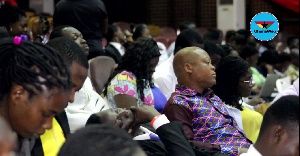Panellists at this year’s 'Students Summit and Job Fair', organised by the Association of Chartered Certified Accountants (ACCA) have told accounting graduates searching for jobs that they need more than just the certificates and job experience to get employed.
Speaking on the topic, “The future of the finance profession”, CEO of PenielStephens Ghana, Stephen Kwame Omane said the profession has moved beyond just presenting numbers, one has to be able to tell the story behind the numbers.
He stated accountants need to be “emotionally intelligent” else they won’t be able to manage their stakeholder relations.
He added that employers are not looking for “people who have a sense of growth, owning their career and so you join the company, you own your career and you grow with it. Another thing is the problem-solving skills we’re talking about.
They expect the up and coming professional to think outside the box and not to be put in a box, in a corner somewhere and say this is how you do your things so think outside the box and be creative. And they will also want us to act locally but think global”.
A Tax Partner at PricewaterhouseCoopers, Ayesha Bedwei said though professional accountants have a profession for life, they need to be ready to evolve with time as the profession keeps evolving.
She said professionals must be willing to engage in life-long learning.
“Learn from experiences, it’s not just about sitting behind your laptop or behind your books and just reading and studying. Yes, it’s very important but it’s important to get life experiences as well. You need to speak to people, you need to travel, you need to open your mind, expand your mind and learn from other people and other cultures. It helps you apply certain changes in your life and also in your profession to be able to take yourself to the next level,” she said.
For President of the Association of Women Accountants, Ghana, Belinda Dede Tandor, communication is key.
She said professionals can only convince people if they are able to explain themselves in a way their listeners can understand and not just explain strategy and what they see on paper.
“I have seen a lot of people come for interviews and they know about the technical skills but you ask them things related to organisational management and they are not able to tell you what an organisation does and what happens in an organisation,” she said.
She added that “it’s not just about knowing the standards and talking about the standards which you have not even worked with anyway but it’s about understanding how you as a person can support a business and be able to convince the people who are going to employ you as to how you can help”.
Business News of Sunday, 16 July 2017
Source: www.ghanaweb.com













